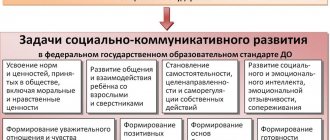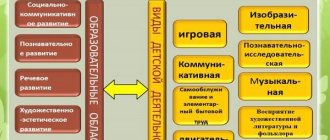Wikipedia - the free encyclopedia ru.wikipedia.org
Search by articles of the free universal encyclopedia
, written in Russian. Selected articles, interesting facts, the current day in history, links to thematic portals and related projects.
Currently, the number of pedagogical network communities is growing rapidly. Network communities are developing at the level of school, region, subject areas, and problems. Each teacher can decide independently which community to choose for himself. This gives him the opportunity for professional growth, starting from a simple observer of the life process of a network resource, to an expert, and maybe even an administrator of his own community.
Bibliography:
- Aleksashina I.Yu. Pedagogical idea: origin, comprehension, implementation: Practical methodology for solving pedagogical problems. – St. Petersburg: Spetslit, 2000.
- Vershlovsky S. Continuing education as a factor of socialization. // [electronic resource] Knowledge Society of Russia. URL: https://www.znanie.org/jornal/n1_01/nepreriv_obraz.html
- Dalworth Mike, Social Media. Manual. // Publisher: “Good Book”. - M., 2010
- Zaitsev S. Not instead, but together // School Director. – 2006. – No. 4.
- Ilyushin L.S. Monitoring the quality of continuing teacher education: problems and development prospects. /Problems of systemic research of teacher education/ Collection of scientific articles of the All-Russian Scientific and Practical Conference St. Petersburg April 15, 2010 St. Petersburg 2010.
- Kazakova E.I., Tryapitsyna A.P. Dialogue on the ladder of success. – St. Petersburg: Petersburg – XXI century, 1997.
- Kulyutkin Yu.N., Mushtavinskaya I.V. Educational technologies and pedagogical reflection. – St. Petersburg: SPbGUPM, 2003.
- Lebedev O.E., Bakushina A.N. and others. New quality of school education: the possibilities of a modern school. /Under. ed. O.E. Lebedeva. – St. Petersburg, 2003.
- EU Continuing Education Memorandum 2000 // [electronic resource] Knowledge Society of Russia. URL: https://www.znanie.org/docs/memorandum.html
- “On approval of the rules for posting on the official website of an educational organization on the Internet information and telecommunications network and updating information about the educational organization.” Decree of the Government of the Russian Federation dated July 10, 2013 No. 582.
- “On information, information technologies and information protection” Federal Law of July 27, 2006 No. 149-FZ
- Prikot O.G. Pedagogy of identification and pedagogical systemology. – St. Petersburg: TVPinc Publishing House, 1995.
- Prokhorov A. Social networks and the Internet. – (Secrets of the Internet) // ComputerPress. – 2006. – No. 10.
- Sukhobskaya G.S., Sokolovskaya E.A. The problem of creative activity of a teacher and professionalism // Information bulletin. Problems of lifelong education: teaching staff. – 1998. – No. 11.
- Shishkova A.R. Motivational characteristics of Internet and social network users. – St. Petersburg Peter, 2006.
- Ulyanova N.N. Prospects for the development of a school social network as a space for students’ informal education. Educational management. Sat. articles / Under the general editorship. ON THE. Zaichenko. – St. Petersburg: National Research University Higher School of Economics, 2012.
- Ulyanova N.N. Network forms of advanced training as a condition for continuous education of a teacher. Postgraduate education: resources for innovative development. Materials of the international scientific-practical conference of the department of pedagogy and andragogy. / Edited by S.G. Vershlovsky, A.N. Sheveleva. – St. Petersburg: APPO, 04/9/2013.




